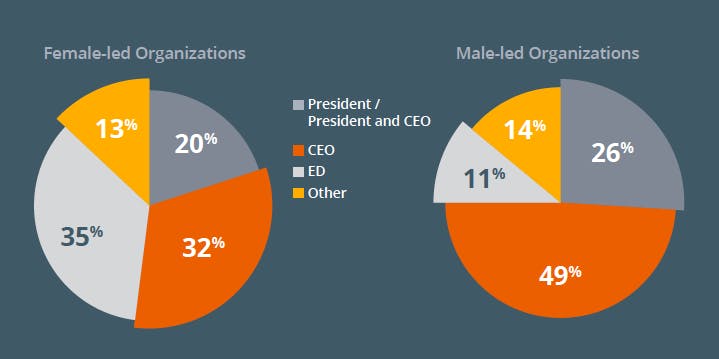
Beyond the Glass Ceiling: Understanding Gender Inequities in the Jewish Communal Workforce
As President & CEO of Leading Edge, I represent a minority of women who hold top leadership positions in the Jewish nonprofit sector. While approximately 70% of our sector’s workforce identifies as women, women represent only 30% of our CEOs. At Leading Edge, an organization that focuses on building a robust leadership pipeline for Jewish nonprofits, I am acutely aware that I have broken through what is still a glass ceiling in 2018.
Of course, executive leadership is not the only site of gender disparity. Consider, for instance, organizational budgets. Data show that male-led organizations have an average budget size almost three times that of female-led organizations.
With these challenges in mind, Leading Edge applied a more focused gender equity lens to our 2018 Employee Experience Survey. We did so by integrating survey questions that would shed light on women’s experiences in the workplace. We were able to filter for women’s answers using an individual’s response to our gender question. We also ensured that our survey allowed for the expression of a range of gender identities beyond the usual “Woman,” “Man,” options and consulted with Keshet on best practices.

A total of 7,300 professionals across 105 Jewish organizations participated in this year’s survey. The responses we received were similar to industry standards. Still, the pain points are difficult to digest. Here are some significant gender-related findings:
1. Women experience a disconnect between their desire to advance professionally and their perceived opportunities for advancement.
Our survey found that despite their desire to advance, women believe they have fewer opportunities to do so than their male colleagues (this finding is supported by other research, including this treasure-trove from Advancing Women Professionals). In Leading Edge’s review of comments related to this topic, we found that female participants described both a lack of opportunities for advancement as well as a culture that demands more sacrifice from women, making healthy work-life integration even more elusive. For men, comments described primarily a lack of desire to stay within the sector. This is an area that merits further action, as its impact can be fateful. If women, in particular, do not see advancement opportunities that could fit into their lives, their aspirations for leadership may be quashed.
2. Women feel less psychologically safe in our workplaces than men.
The survey assessed psychological safety by posing questions about people’s comfort speaking up, providing feedback to others, and sharing potentially unpopular opinions. Across sectors, when it comes to attitudes around psychological safety, research shows that, in general, women are less comfortable speaking up in the workplace. They often worry about how they will be perceived, while men tend to be more secure in revealing what is on their minds. This disparity shapes our organizational cultures in profound ways and indicates that there is still work to be done to promote greater psychological safety in our workplaces.
3. Setting and discussing compensation is a common pain point for all managers, but female employees, in particular, feel unclear about how compensation and raises are determined.
Our survey found that men are 12% more likely than women to understand how compensation, salary, and raises are set at their organization. We believe this reality may be because more men hold leadership positions within Jewish organizations, so they are privy to such information or are the decision-makers for financial matters. Jewish organizations overall need to prioritize how they determine and communicate compensation philosophies to make our sector more equitable.
4. Male respondents feel less positive about the leadership of female CEOs than male CEOs.
A growing body of research shows that people assume the competence of male leadership but scrutinize or question women leaders until they prove themselves. The data in our survey seems consistent with this unconscious bias and the differences in how gender impacts perceptions of leaders. Being aware of such biases is a positive first step in ameliorating them. What we want and need, fundamentally, is to expand our mental models of what a leader looks like and who a leader is. The Jewish community needs a multiplicity of voices to lead us into the future, and we need to deploy all of our available talent in service of achieving our collective mission.
Like so many sectors in the United States, the Jewish nonprofit sector must do better to diminish the gender disparities within our field. There is no magic bullet for achieving equity. Creating a systemic shift requires an ongoing commitment from leaders who are willing to place equitable workplace culture at the forefront of their agendas. It demands radical patience and a willingness to stay the course.
At the same time, the simplest nudges could have a huge impact.
For instance, the Leading Edge Survey also found that in our sector, male executives more often have the title “President & CEO” while female executives are more often called “Executive Director,” even when they lead organizations of the same size.
We at Leading Edge are not immune to the unconscious bias that fuels this disparity. Prior to these findings, my title had been Executive Director. After we saw this data, the Leading Edge board voted to change my title to President & CEO. In making this change, our board was clear and unequivocal that I had earned this title, and I have a newfound appreciation for the impact of these kinds of nudges. These are more than cosmetic changes; titles go a long way in signaling value and leveling the playing field.
The research presented here shines a light on the many growth opportunities for all of our organizations.
Small steps matter. By identifying the inequities in our system, we can begin to fix them.
This article originally appeared in eJewish Philanthropy on December 3, 2018.
Related Resources
View the Resource Library
 ReportExecutives
ReportExecutivesCEO Succession: Case Studies of Excellence from the Jewish Nonprofit Sector
These case studies offer a candid, personal look at the inner workings of CEO transition processes at six major Jewish organizations.
 ArticleLeadership
ArticleLeadershipA Path Forward in Jewish Leadership Development
Leading Edge COO Mordy Walfish reflects on the importance of building a sector comprised of diverse leadership in this installment of a Jim Joseph Foundation series on Leadership Development.
 ArticleLeadership
ArticleLeadershipReflections on Leadership and Unconscious Bias
The President & CEO of Leading Edge shares reflections on navigating unconscious bias in a leadership role.
Loading footer...